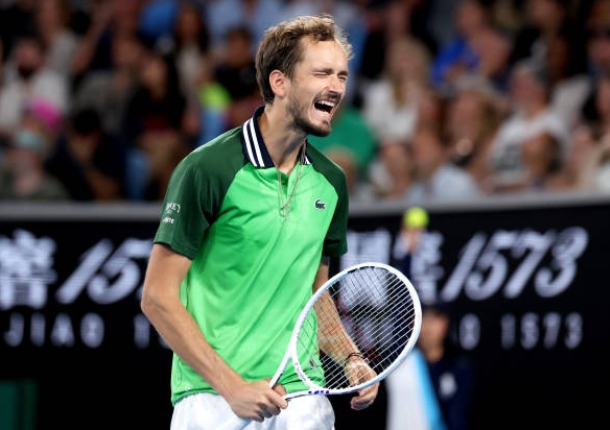
By Erik Gudris | @atntennis | Sunday, January 21, 2024
In a trend that no one wanted to see repeat from last year, many matches in Melbourne in the first week either started late in the evening and/or finished very, very early in the morning.
Former two-time AO champion Victoria Azarenka described the situation best by saying, "If we're going to be honest with ourselves, what are people looking for? They're not looking for five-hour matches." She added, "I haven't been able to sit through one. It's just too long."
Vika is right.
No one, not players, not fans (well, perhaps a few that have nothing better to do than watch tennis all day/night), and no organizers want to see this trend continue.
Don’t get me wrong. Late night or early morning matches had a certain charm a while ago. How many crazy, intense early morning finishes on the legendary Grandstand court at the US Open back in the day do you remember. Certainly other tournaments had their share of exciting matches that stretched past midnight. The problem is that now, these matches are not outliers, they are become more and more often the norm.
Organizers for this year's Australian Open added an extra day, likely to make money for ticket sales but also to help with the late-night matches issues.
It didn't help.
Thursday night saw some of the longest night matches in recent memory go down. First was Elena Rybakina and Anna Blinkova's battle, which featured the longest final set tiebreak in Grand Slam history. That meant Daniil Medvedev and Emil Ruusuvori didn't get on the court for their match until after 11 pm. That match went the distance – five sets – with Medvedev finally prevailing near 4 am.
"What is it, 3:40 in the morning?" Medvedev joked to those who stayed in the crowd afterward, "Honestly, guys, I would not be here. Thanks for staying. If I would be a tennis fan and I would come, I would be at one a.m., 'Let's go home, we're going to catch the end of the match on TV,' watch thirty minutes and then go to bed."
Andy Murray, who played a match in Melbourne last year that went beyond 4 a.m. local time, added his comments on the subject this year by saying "It's a very obvious thing that needs to change. I haven't heard anyone really disagree with that.
Last year, after defeating Thanasi Kokkinakis very early in the morning Murray said afterwards. "It's not beneficial for (ballkids). "It's not beneficial for the umpires, the officials. I don't think it's amazing for the fans. It's not good for the players. We talk about it all the time. It's been spoken about for years. When you start the night matches late and have conditions like that, these things are going to happen."
The ATP and WTA recently announced a joint match scheduling initiative that includes not having matches go on the court after 11 pm (unless approved by a supervisor with consultation with ATP/WTA management). However, this initiative only applies to tour matches, not the Grand Slam tournaments.
Unfortunately, as the saying goes, the road to hell is paved with good intentions. No tournament organizer can control the weather, acts of God, or other delays that cause matches to get backed up worse than traffic on an on-ramp for the 405 highway in Los Angeles.
While the tours, and likely the Grand Slams, introduce similar initiatives to stem the tide of these late matches, more radical changes may be needed.
The game, significantly how it's played, has changed so much over the years that to keep players healthy and fans with shorter attention spans entertained, changes to scoring, how many sets are played at majors, and other format changes may be the only solution.
That will likely not sit well with the powers that be and other traditionalists, but think of it this way: where would tennis be today without the tiebreak, invented by James Van Alen in 1965?

Once considered pure heresy, it's now a fundamental part of the game at all levels.
Will change happen in time this year to help keep players healthy and fans engaged? Only time will tell.
Photo Credit: Getty Images